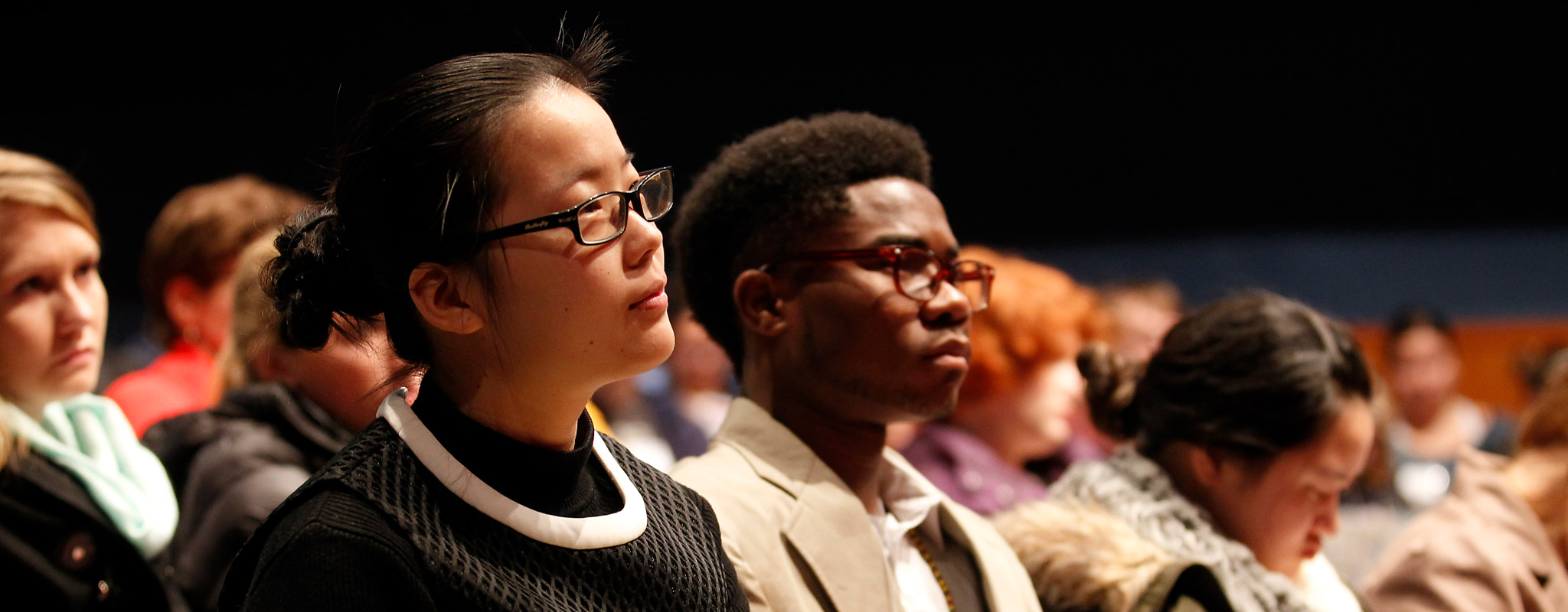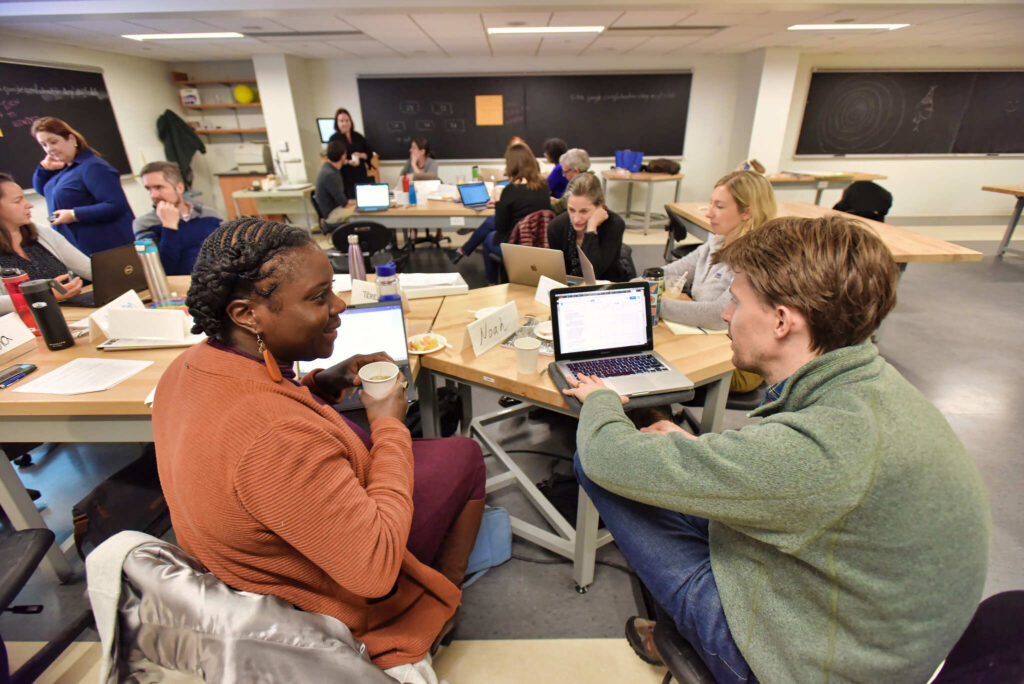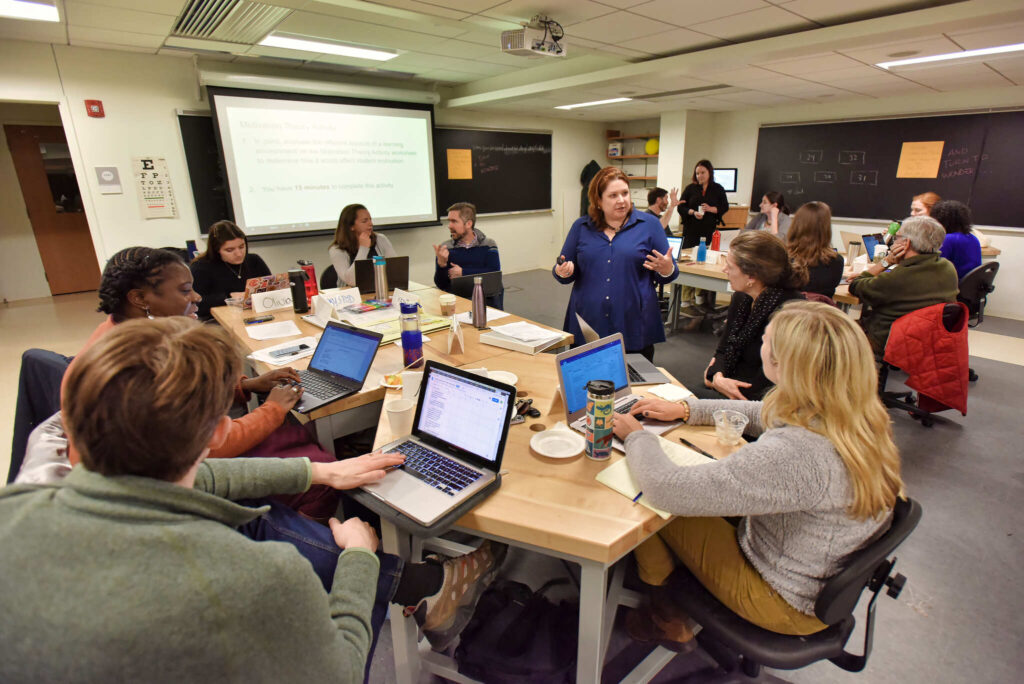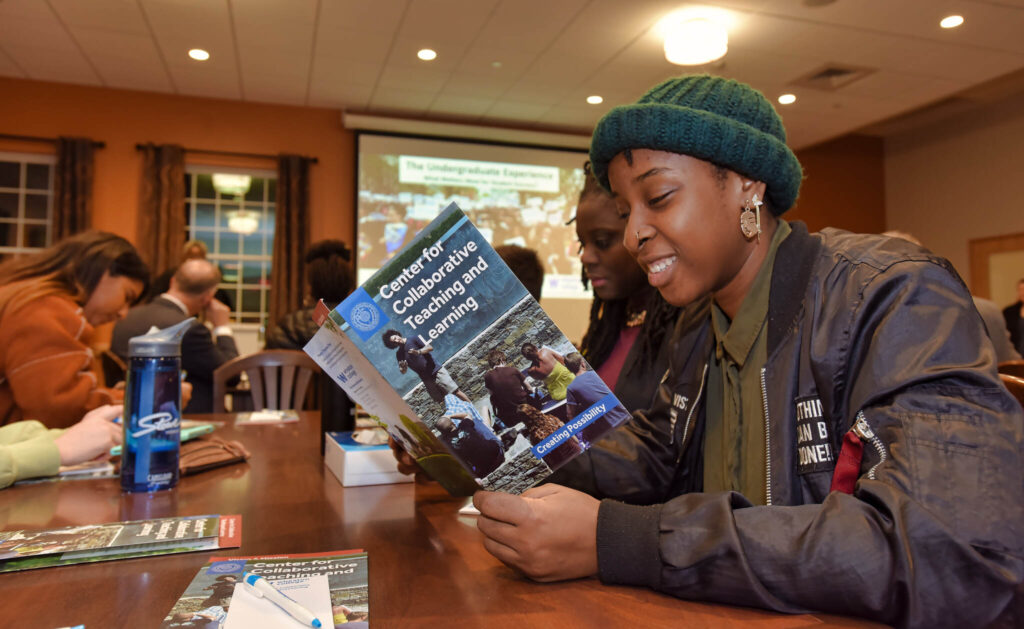Wheaton College has a strong tradition of inclusive, collaborative, and innovative teaching. The CCTL (Center for Collaborative Teaching and Learning) plays an instrumental role in supporting this tradition through advancing pedagogies that align with the college’s mission to provide a transformative liberal arts education for its culturally diverse student body. Discover more about us and the student-centered teaching methods we embrace and encourage.
On this page:
Inclusive Pedagogy
Inclusive pedagogy is a teaching approach that values and respects the diverse backgrounds, abilities, and perspectives of all learners. It fosters an inclusive learning environment where every student feels supported, engaged, and empowered to succeed.
At its core, inclusive pedagogy recognizes that learners come with unique experiences, knowledge, and learning styles. It seeks to create equitable opportunities for all students, regardless of their race, ethnicity, gender, socio-economic status, language, disability, or any other aspect of identity. By embracing diversity and promoting inclusivity, inclusive pedagogy aims to enhance learning outcomes and promote social justice within the educational setting.
Key Principles of Inclusive Pedagogy
Universal Design for Learning (UDL)
Inclusive pedagogy utilizes UDL principles, which involve providing multiple means of representation, engagement, and expression to cater to diverse learning styles and abilities. It ensures that instructional materials and activities are accessible to all students.
Culturally Responsive Teaching
Inclusive pedagogy recognizes and values the cultural backgrounds and experiences of students. Culturally responsive teaching promotes inclusivity by integrating diverse perspectives, histories, and knowledge systems into the curriculum. It creates a classroom environment that respects and appreciates different cultures.
Differentiated Instruction
Inclusive pedagogy embraces instruction that meets the individual needs of students. It involves modifying teaching strategies, materials, and assessments to accommodate various learning styles and abilities. By recognizing and addressing learners’ unique strengths and challenges, differentiated instruction supports their overall development.
Collaborative Learning
Inclusive pedagogy emphasizes collaboration and cooperative learning among students. It encourages peer interactions, group work, and discussions that promote mutual respect, empathy, and understanding. Collaborative learning fosters a sense of community and shared responsibility for the learning process.
Assessment for Learning
Inclusive pedagogy employs a variety of assessment strategies that go beyond traditional testing methods. It includes formative assessments, projects, presentations, and portfolios, allowing students to demonstrate their understanding and skills in different ways. Assessment for learning focuses on growth, progress, and providing constructive feedback to support students’ ongoing development.
Social and Emotional Learning (SEL)
Inclusive pedagogy recognizes the importance of social and emotional well-being in the learning process. It integrates SEL principles to cultivate a positive and supportive classroom climate. SEL skills such as self-awareness, empathy, and responsible decision-making are explicitly taught and reinforced, creating a nurturing environment for all learners.
By embracing inclusive pedagogy, we can create educational experiences that honor and celebrate the diversity of our learners, promote equity and access, and foster a culture of respect, empathy, and inclusivity.
“Differentiating Instruction: It’s Not as Hard as You Think” (YouTube video)
Antiracist Pedagogy
Antiracist pedagogy is an educational approach that actively challenges and dismantles racism in all its forms within the educational setting. It acknowledges the systemic nature of racism and aims to create inclusive learning environments where all students feel valued, respected, and empowered to engage in critical thinking and social activism.
At its core, antiracist pedagogy seeks to disrupt and dismantle the structures of power, privilege, and oppression that perpetuate racial inequalities. It goes beyond simply promoting tolerance and diversity by actively addressing and confronting racial injustices. By integrating antiracist principles into teaching practices, curriculum, and classroom discussions, antiracist pedagogy fosters a culture of equity, justice, and social change.
Key Principles of Antiracist Pedagogy
Critical Consciousness
Antiracist pedagogy encourages students to develop a critical consciousness and examine the social, cultural, and historical contexts that shape racial inequalities. It promotes a deeper understanding of power dynamics, implicit biases, and systemic racism, empowering students to become active agents of change.
Centering Marginalized Voices
Antiracist pedagogy amplifies the voices, experiences, and perspectives of marginalized communities and individuals. It intentionally includes diverse narratives, histories, and contributions that have been historically marginalized or excluded. By centering these voices, it challenges dominant narratives and fosters a more inclusive and accurate representation of knowledge.
Challenging Stereotypes and Biases: Antiracist pedagogy engages students in critical conversations about stereotypes, biases, and prejudice. It encourages students to critically analyze media representations, cultural assumptions, and societal norms that perpetuate racial stereotypes. By challenging these biases, antiracist pedagogy promotes a more accurate and nuanced understanding of racial identities.
Intersectionality
Antiracist pedagogy recognizes that racism intersects with other forms of oppression, such as sexism, ableism, homophobia, and classism. It acknowledges the interconnected nature of these systems of oppression and promotes an understanding of how they intersect and impact individuals’ experiences. By addressing intersectionality, antiracist pedagogy aims to create a more inclusive and holistic approach to social justice.
Empowering Activism
Antiracist pedagogy empowers students to become advocates for racial justice and change agents within their communities. It encourages students to use their voices, engage in civic participation, and take action against racism. By fostering a sense of agency and social responsibility, antiracist pedagogy equips students with the tools and skills to challenge and dismantle systemic racism.
Reflective Teaching Practices
Antiracist pedagogy requires educators to engage in continuous self-reflection and examine their own biases and privileges. It calls for ongoing professional development and a commitment to personal growth and learning. Reflective teaching practices help educators create inclusive and antiracist learning environments that support the well-being and success of all students.
By embracing antiracist pedagogy, we can work towards a more just and equitable society, where every individual has the opportunity to thrive, regardless of their race or ethnicity. Together, we can create educational spaces that challenge systemic racism, empower students, and cultivate a generation of critical thinkers and change-makers.
A Tale of Two Teachers | Melissa Crum | TedXColumbusWomen (YouTube video)
Student Success Pedagogy
Student Success Pedagogy is an approach to teaching and learning that focuses on fostering the skills, attitudes, and behaviors necessary for students to achieve academic, personal, and career success. Student Success Pedagogy aims to empower students to take ownership of their learning, develop effective study strategies, enhance critical thinking skills, and navigate challenges they may encounter during their educational journey.
Key principles of Student Success Pedagogy
Active Learning Strategies
Student success pedagogy engages students in the learning process. This can include group discussions, problem-solving activities, hands-on projects, and real-world applications of knowledge. Active learning promotes student engagement, critical thinking, and retention of information.
Metacognition and Self-Reflection
Student success pedagogy encourages students to develop metacognitive skills, which involve understanding their own learning processes, setting goals, monitoring progress, and reflecting on their learning experiences. By becoming more aware of their strengths and weaknesses as learners, students can make informed decisions about their study habits and strategies.
Growth Mindset
Student success pedagogy supports the belief that intelligence and abilities can be developed through effort, practice, and perseverance. By cultivating a growth mindset, students are more likely to embrace challenges, persist in the face of setbacks, and view failures as opportunities for growth.
Academic and Life Skills Development
Student success pedagogy includes explicit instruction and support for developing essential academic and life skills. This can encompass time management, organization, note-taking, critical thinking, problem-solving, communication, and digital literacy skills. These skills are essential for student success both within and beyond the classroom. Wheaton faculty also collaborate with staff professionals in academic advising and accessibility services, career services, counseling, health and wellness centers, the campus library, and other academic support departments in this effort.
Supportive Learning Environment
Student Success Pedagogy recognizes the importance of creating a supportive and inclusive learning environment. This involves fostering positive relationships between students and instructors, promoting collaboration and teamwork, and providing opportunities for students to connect with their peers. A supportive environment encourages active participation, engagement, and a sense of belonging.
Student Engagement and Motivation
Student success pedagogy emphasizes strategies to enhance student engagement and motivation. This can include using relevant and meaningful examples, incorporating technology, offering choice and autonomy in learning tasks, and providing constructive feedback. Engaged and motivated students are more likely to persist, succeed, and develop a love for learning.
Small Teaching at Wheaton College
https://www.youtube.com/watch?v=J2mwqJ4gdxA
About Us
At Wheaton College, we pride ourselves on being exceptional teacher-scholars, experts in our respective fields. We seamlessly fuse teaching with our scholarly research, going beyond traditional classroom boundaries. This unwavering commitment inspires intellectual curiosity, cultivates a dynamic, interactive learning environment, and equips our students to attain their maximum academic and personal potential.
CCTL Faculty Affiliates
Primrose Boynton
Assistant Professor of Biology
[email protected]
Deyonne Bryant
Samuel Valentine Cole Professor of English and Mary Heuser Chair in the Arts
Director, Center for Collaborative Teaching and Learning
[email protected]
Geoffrey Collins
Professor of Geology
[email protected]
Sara Donaldson
Assistant Professor of Education
[email protected]
Scott Gelber
Professor of Education; Department Chair;
CCTL Faculty Affiliate (Inclusive Pedagogy, Experiential Learning, Assessment)
[email protected]
Fatima Jebari
Assistant Professor of Business and Management
[email protected]
Jessie Knowlton
Assistant Professor of Biology; Program Coordinator of Environmental Sciences
[email protected]
Kent Shaw
Associate Professor of English
[email protected]
Alessandra E. Ward
Assistant Professor of Education
[email protected]



